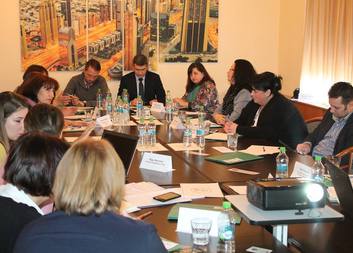Caritas Czech Republic in Moldova has been taking care of vulnerable children over a long period of time. Since October 2015, Caritas has focused on the inclusion of children with special educational needs into regular kindergarten. There is currently training in all districts of Moldova, where teachers, administrative staff and representatives of public administration meet to discuss the integration process in more complicated cases.
Together with the Moldovan NGO, Woman and Child - Protection and Support, Caritas seeks better cooperation between people and institutions dealing with the same problem. As a result, representatives of district councils, district education offices, services of psycho-educational support or the social care department of the local public administration attended 35 meetings focused both on the discussion about individual cases of inclusion, and on the overall efficiency of the system of inclusion in Moldova. They are also looking for ways to educate responsible professionals.
The meetings are also attended by nurserymen who are aware of the problems of the current situation: “It will be necessary to focus on early identification of special educational needs for specific children. Teachers must learn how to recognize the problem and how to deal with different kinds of problems already in preschool education so that they would not be detrimental tothe child. They cannot be afraid of cooperation with social and other professionals,” says L. Bujor, director of one of the kindergartens in Bălţi. It is also essential to change the thinking about worse incorporable children: “We need to reduce the negative attitudes towards inclusion. Kindergartens should cooperate with special educators, psychologists and speech therapistsmore openly. Teachers also lack the experience in dealing with parents of children with special educational needs."
Representatives of Caritas Czech Republic also emphasize to representatives of public administration the importance of discovering the number of children who have been denied their right to education. Mapping the situation will help local governments allocate funds to support families who are raising endangered children and to provide them with equal opportunities.
Besides knowledge sharing, the main objective remains raising awareness of the issue and the needs of inclusive educationthus select media will attend the meetings. 35 district trainings will be followed by six regional ones. All participants will be invited to the final conference in 2017.
The inclusive education in kindergartens in Moldova was supported by the Czech Development Agency and the Ministry of Foreign Affairs of the Czech Republic within the framework of the Program for Foreign Development Cooperation of the Czech Republic.
![]()







